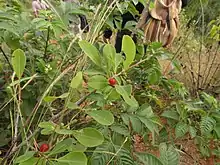| Erythroxylum monogynum | |
|---|---|
 | |
| Scientific classification | |
| Kingdom: | Plantae |
| Clade: | Tracheophytes |
| Clade: | Angiosperms |
| Clade: | Eudicots |
| Clade: | Rosids |
| Order: | Malpighiales |
| Family: | Erythroxylaceae |
| Genus: | Erythroxylum |
| Species: | E. monogynum |
| Binomial name | |
| Erythroxylum monogynum Roxb. | |
| Synonyms | |
| |
Erythroxylum monogynum, the bastard sandal or red cedar, is a tropical tree in the family Erythroxylaceae. It is native to Peninsular India and Sri Lanka. It is a small, evergreen bushy tree reaching 7 m (23 ft) (but sometimes higher). The leaves are simple, alternate. Small white flowers are bisexual with 5–6 sepals. borne March through June; Fruit is a one-seeded drupe. Flowering and fruiting occur throughout the year.[2] The plant is known to have high medicinal value. It is taken to cure many diseases such as Stomachache, Dyspepsia, Fever, and Dropsy in ayurvedic medicine.[3]
References
- ↑ "Erythroxylum monogynum Roxb". The Plant List.
- ↑ "Erythroxylum monogynum Roxb. Accepted Name". India Biodiversity Portal.
- ↑ "Erythroxylum monogynum $". Ayurvedic Medicianal Plants of Sri Lanka.
External links
Wikimedia Commons has media related to Erythroxylum monogynum.
This article is issued from Wikipedia. The text is licensed under Creative Commons - Attribution - Sharealike. Additional terms may apply for the media files.